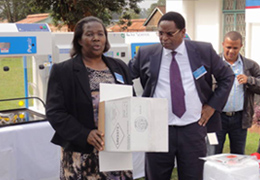The IDENTIFY project (component of USAID EPT programme) organized a training workshop on OIE standards for collection and shipping of samples at Kabete, Kenya, from 9th to 11th August 2011. National Animal Health Laboratories of each IDENTIFY country nominated participants who receive pathological specimens from their satellite laboratories and who are responsible for forwarding specimens to reference laboratories. The workshop was attended by 21 participants from Congo Basin countries of Angola, Cameroon, Central African Republic, Republic of Congo, Ethiopia, Gabon, Kenya, Rwanda, Sudan, Tanzania and Uganda. South Sudan attended as an observer.
The meeting was officially opened by the Director of Veterinary Services, Kenya, the OIE Delegate, Dr Peter Ithondeka. In his opening address he stated that “One Health” approach had become important in Kenya and neighboring countries and therefore a regional approach would appropriate in the implementation of health matters. The Director thanked the OIE for choosing Kenya, and especially Kabete to host the training which will benefit the region and improve veterinary laboratories diagnostic capacities. Dr Neo Mapitse, on behalf of the OIE Sub Regional Representative for Eastern and the Horn of Africa, outlined the objectives of the training. The OIE Global Coordinator for IDENTIFY Project, Ms Jennifer Lasley was also present at the training. Trainers were from Botswana Vaccine Institute which is an OIE FMD Reference Laboratory, FAO, Uganda IATA-certified trainer, department of veterinary services of Kenya and the private sector.
The sessions were split into theory, case studies, and practical exercises. They outlined the OIE and its mandate as a standard setting organisation. The sessions highlighted the resources available to OIE member states such as the Manual of Diagnostic Tests and Vaccines for Terrestrial Animals and the OIE Terrestrial Animal Health Code, the OIE Laboratory Twinning Programme, the OIE Reference Laboratory networks and their support to national veterinary laboratories. Also, specific requirements for the shipment of specimens for specified diseases based on IATA requirements were presented.
On behalf of the participants, Dr Sylvain Enkoro from Gabon expressed his gratitude to the OIE, USAID and the Kenya Veterinary Authority for inviting them, and sponsoring and hosting the training which enormously benefited the laboratories in the Congo Basin region. The workshop was officially closed by the representative from DVS Kenya, Dr Wycliffe Wangwe, and the OIE Sub- Regional Representative, Dr Walter Masiga.
All pictures (c) N. Mapitse (oie) 2011
